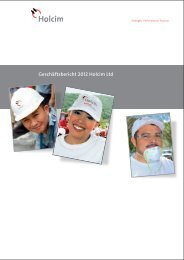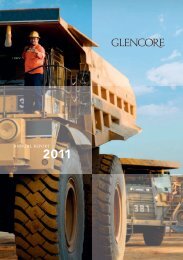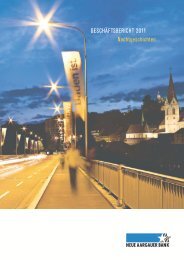Transocean Proxy Statement and 2010 Annual Report
Transocean Proxy Statement and 2010 Annual Report
Transocean Proxy Statement and 2010 Annual Report
Create successful ePaper yourself
Turn your PDF publications into a flip-book with our unique Google optimized e-Paper software.
Exchange Act. The plaintiff claims that GlobalSantaFe shareholders received inadequate consideration for their shares as a result of the<br />
alleged violations <strong>and</strong> seeks rescission <strong>and</strong> compensatory damages.<br />
Shareholder derivative claims—In June <strong>2010</strong>, two shareholder derivative suits were filed by our shareholders naming us as a<br />
nominal defendant <strong>and</strong> certain of our officers <strong>and</strong> directors as defendants in the District Courts of the State of Texas. The first case<br />
generally alleges breach of fiduciary duty, unjust enrichment, abuse of control, gross mismanagement <strong>and</strong> waste of corporate assets in<br />
connection with the Macondo well incident <strong>and</strong> the other generally alleges breach of fiduciary duty, unjust enrichment <strong>and</strong> waste of<br />
corporate assets in connection with the Macondo well incident. The plaintiffs are generally seeking, on behalf of <strong>Transocean</strong>, restitution<br />
<strong>and</strong> disgorgement of all profits, benefits <strong>and</strong> other compensation from the defendants.<br />
Environmental matters—Environmental claims under two different schemes, statutory <strong>and</strong> common law, <strong>and</strong> in two different<br />
regimes, federal <strong>and</strong> state, have been asserted against us. See “—Litigation—Economic loss.” Liability under many statutes is imposed<br />
without fault, but such statutes often allow the amount of damages to be limited. In contrast, common law liability requires proof of fault<br />
<strong>and</strong> causation, but generally has no readily defined limitation on damages, other than the type of damages that may be redressed. We<br />
have described below certain significant applicable environmental statutes <strong>and</strong> matters relating to the Macondo well incident. As described<br />
below, we believe that we have limited statutory environmental liability <strong>and</strong> we are entitled to contractual defense <strong>and</strong> indemnity for all<br />
liabilities for pollution or contamination, other than for pollution or contamination originating on or above the surface of the water. See “—<br />
Contractual indemnity.”<br />
Oil Pollution Act—OPA imposes strict liability on responsible parties of vessels or facilities from which oil is discharged into or<br />
upon navigable waters or adjoining shore lines. OPA defines the responsible parties with respect to the source of discharge. We believe<br />
that the owner or operator of a mobile offshore drilling unit (“MODU”), such as Deepwater Horizon, is only a responsible party with respect<br />
to discharges from the vessel that occur on or above the surface of the water. As the responsible party for Deepwater Horizon, we believe<br />
we are responsible only for the discharges of oil emanating from the rig. Therefore, we believe we are not responsible for the discharged<br />
hydrocarbons from the Macondo well.<br />
Responsible parties for discharges are liable for: (1) removal <strong>and</strong> cleanup costs, (2) damages that result from the discharge,<br />
including natural resources damages, generally up to a statutorily defined limit, (3) reimbursement for government efforts <strong>and</strong> (4) certain<br />
other specified damages. For responsible parties of MODUs, the limitation on liability is determined based on the gross tonnage of the<br />
vessel. The statutory limits are not applicable, however, if the discharge is the result of gross negligence, willful misconduct, or violation of<br />
federal construction or permitting regulations by the responsible party or a party in a contractual relationship with the responsible party.<br />
Additionally, the National Pollution Funds Center (“NPFC”), a division of the U.S. Coast Guard, is charged with administering the<br />
Oil Spill Liability Trust Fund (“OSLTF”). The NPFC collects fines <strong>and</strong> civil penalties under OPA from responsible parties, as defined in the<br />
statute. The payments are directed to the OSLTF. To date, the NPFC has issued nine invoices to BP, Anadarko Petroleum Corporation<br />
(together with its affiliates, “Anadarko”) <strong>and</strong> MOEX Offshore LLC (together with its affiliates, “MOEX”), as the operator <strong>and</strong> leasehold<br />
owners of the well <strong>and</strong>, thus, the statutorily defined responsible parties for discharges from the well <strong>and</strong> wellhead. To date, BP has paid all<br />
nine of these invoices. Invoices have also been sent to us, <strong>and</strong> we have acknowledged responsible party status only with respect to<br />
discharges from the vessel on or above the surface of the water, if any.<br />
In addition, on December 15, <strong>2010</strong>, the DOJ filed a civil lawsuit against us <strong>and</strong> other unaffiliated defendants. The complaint<br />
alleges violations under OPA <strong>and</strong> the Clean Water Act, <strong>and</strong> the DOJ reserved its rights to amend the complaint to add new claims <strong>and</strong><br />
defendants. The complaint asserts that all defendants named are jointly <strong>and</strong> severally liable for all removal costs <strong>and</strong> damages resulting<br />
from the Macondo well incident. In addition to the civil complaint, the DOJ served us with Civil Investigative Dem<strong>and</strong>s (“CIDs”) on<br />
December 8, <strong>2010</strong>. These dem<strong>and</strong>s are part of an on-going investigation by the DOJ to determine if we made false claims in connection<br />
with the acquisition of the leasehold interest in the Mississippi Canyon Block 252, Gulf of Mexico <strong>and</strong> drilling operations on<br />
Deepwater Horizon.<br />
We have also received claims directly from individuals, pursuant to OPA, requesting compensation for loss of income as a result<br />
of the Macondo well incident. BP has accepted responsible party status with the U.S. Coast Guard for the release of hydrocarbons from<br />
the Macondo well <strong>and</strong> has stated its intent to pay all legitimate claims, <strong>and</strong> we have not paid any of these claims.<br />
Other federal statutes—Several of the claimants have made assertions under other statutes, including the Clean Water Act, the<br />
Endangered Species Act, the Migratory Bird Treaty Act, the Clean Air Act, the Comprehensive Environmental Response Compensation<br />
<strong>and</strong> Liability Act <strong>and</strong> the Emergency Planning <strong>and</strong> Community Right-to-Know Act.<br />
State environmental laws—As of December 31, <strong>2010</strong>, claims had been asserted by private claimants under state environmental<br />
statutes in Florida, Louisiana, Mississippi <strong>and</strong> Texas. As described below, claims asserted by various state <strong>and</strong> local governments are<br />
pending in Alabama, Florida, Louisiana <strong>and</strong> Texas.<br />
In June <strong>2010</strong>, the Louisiana Department of Environmental Quality (the “LDEQ”) issued a consolidated compliance order <strong>and</strong><br />
notice of potential penalty to us <strong>and</strong> certain of our subsidiaries asking us to eliminate <strong>and</strong> remediate discharges of oil <strong>and</strong> other pollutants<br />
into waters <strong>and</strong> property located in the State of Louisiana, <strong>and</strong> to submit a plan <strong>and</strong> report in response to the order. We requested that the<br />
LDEQ rescind the enforcement actions against us <strong>and</strong> our subsidiaries because the remediation actions that are the subject of such orders<br />
are actions that do not involve us or our subsidiaries, as we are not involved in the remediation or clean-up activities. Alternatively, if the<br />
AR-26

















